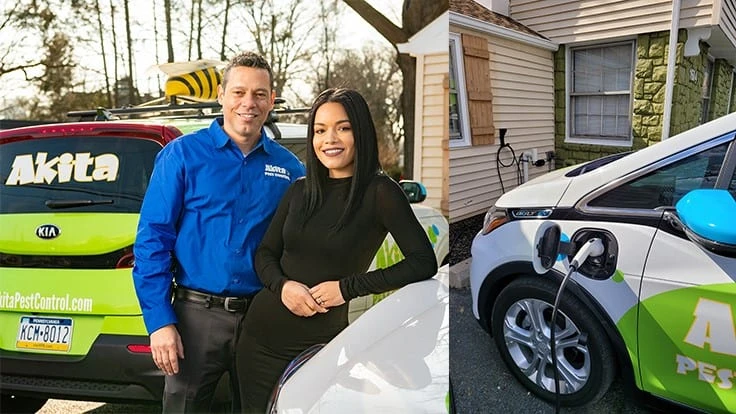
LANCASTER, Pa. — Akita Pest Control, Lancaster, Pa., has prided itself on being environmentally conscious and fuel-efficient since its inception in 2006. Following the recent purchase of the company’s first electric vehicle, owner Bobby Leon plans to ultimately replace 80 percent of his fleet with electric cars.
Akita has 18 vehicles: three trucks and 15 cars, one of which is a newly purchased Chevrolet Volt that offers a range of 200 miles on a full electric charge. Leon purchased the Volt used with 10,000 miles on it, which dropped the price from about $30,000 to $20,000, he said. Electric vehicles are still more pricey upfront than standard cars, he explained.
“The downfall is most electric vehicles don't come stripped down,” said Leon. “They come with a lot of high-end features.”
However, he said he hopes that with savings over time, the car will pay for itself. In the meantime, he is keeping his eyes peeled for any new government incentives for buying electric.
“There are incentives that are out there,” said Leon. “But incentives pretty much don't add up to where you see enough savings. I was hoping with this new administration that's out now that maybe they will introduce some more incentives to push people to go electric.”
If the government rolls out more incentives, Leon said he hopes to start buying electric vehicles new. “If not, I might just continue to go this route with very slightly used,” he said.
Akita team members have responded positively to the Volt, Leon said, which needs a charge about every three days. An electrician installed a professional 220-volt charger outside the business, which has a designated electric vehicle parking area.
“The car comes standard with a 110v home outlet charger, but I do not recommend that at all,” Leon said. “It is very slow. We installed an exterior 220v rapid charger.”
The charger cost $280, he said, and professional installation cost $582. The 220-volt chargers vary in cost from about $180 to $600, but Leon said that after doing some research, he found that “the quality is very close across the board, and the charging output is exactly the same.” Professional installation costs also vary; at Akita, Leon said the electrician “had a lot of extra work to do in order to make it happen.”
Leon made sure to leave room for more parking and charging as his electric fleet grows. The charger provides about 25 miles of charging for every hour.
“Overnight, it charges in no time,” Leon said.
He placed a deposit to be added to the reserve list for the new, all-electric Tesla Cybertrucks, which he hopes will replace his two termite trucks. Tesla plans to produce the first Cybertrucks at the end of the year, according to its website.
“I see it [going electric] actually happening a lot faster than what people expect,” Leon said.
Some of his staff expressed reservations before getting behind the wheel of an electric vehicle and think they won’t like it, he said.
“As soon as they get behind one, they change their mind right away,” said Leon.
The other cars in Akita’s fleet are small, fuel-efficient vehicles, he said.
“I've come to realize that you don't really need a big, giant truck to run a route or four-wheel drive or anything like that,” he said. “Little cars are just fine. I used to work in New York City for a while, and I used to run a walking route many, many years ago. If I can do that, then definitely, guys can run out of a smaller car.”
Two older cars in the fleet are due for replacement by the end of the year, and Leon said he plans to swap them with electric.
“Every time I replace one, I'm going to upgrade to the electric,” he said.
Some of his staff travel long distances on routes, so he doesn’t plan to replace their vehicles quite yet.
“But as the supercharging stations are more available, more spread throughout, we probably will have them for them, too,” said Leon. “It's a matter of parking just for 45 minutes at one of those and you're fully charged, as opposed to overnight.”
Leon feels a personal responsibility toward environmental stewardship and frequently donates to environmental and wildlife causes.
“I feel that we need to do our part in helping out in the world wherever we can,” he said. “And I think emissions is a big thing that's causing a lot of global warming and other things throughout the world. So if we can do our part and still make a profit at the same time, I'm all for switching over.”
| Solar Panels Come with Incentives In another environmentally friendly move, Akita Pest Control plans to install solar panels on its Lancaster, Pa., building. But they might not look like the typical boxy panels we’re all used to seeing. Owner Bobby Leon said he’s eyeing Tesla’s newly designed solar shingles, which mimic the look of an average roof. “We're just trying to pick and choose now to see which ones we actually want on our building,” he said. He added that federal and state incentives for solar panels are currently much higher than incentives for buying electric cars. “It'll be something that'll pay for itself over the course of about 10 years, from what I'm calculating right now,” Leon said. |
Latest from Pest Control Technology
- Donny Oswalt Shares What Makes Termites a 'Tricky' Pest
- Study Finds Fecal Tests Can Reveal Active Termite Infestations
- Peachtree Pest Control Partners with Local Nonprofits to Fight Food Insecurity
- Allergy Technologies, PHA Expand ATAHC Complete Program to Protect 8,500 Homes
- Housecall Pro Hosts '25 Winter Summit Featuring Mike Rowe
- Advanced Education
- Spotted Lanternflies, BMSBs Most Problematic Invasive Pests, Poll Finds
- Ecolab Acquires Guardian Pest Solutions





